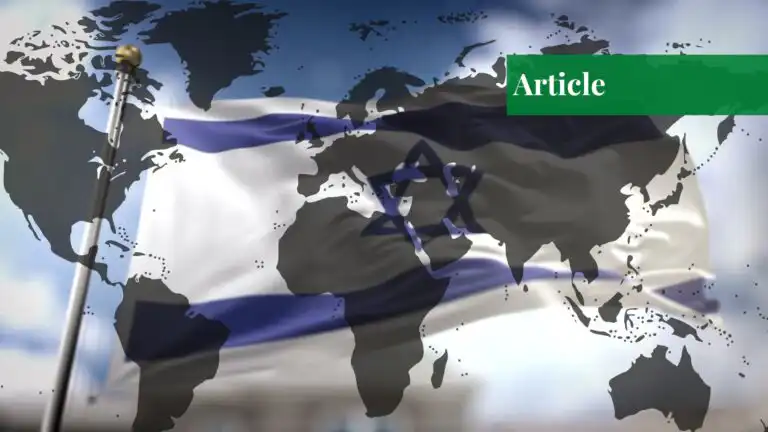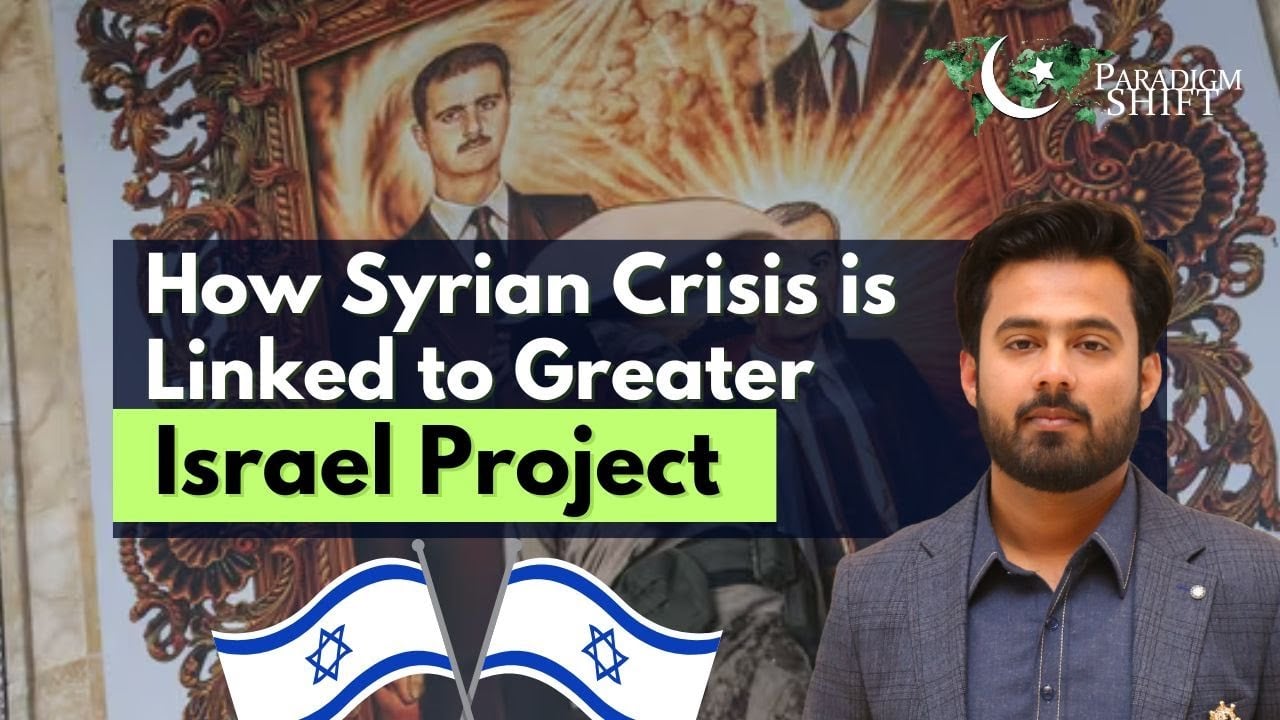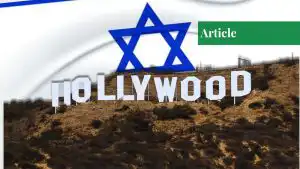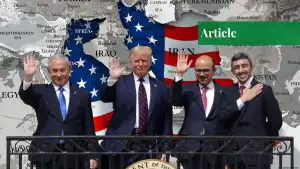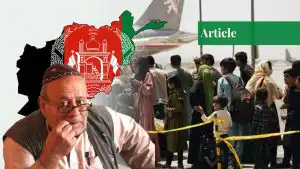Momina Areej is currently pursuing an MPhil in Clinical Pharmacy Practice. With a passion for writing, she covers diverse topics including world issues, literature reviews, and poetry, bringing insightful perspectives to each subject. Her writing blends critical analysis with creative expression, reflecting her broad interests and academic background.
Greater Israel is a mix of theological discussion, political ideology, and regional geopolitics. An idea out of ancient scripture, it has emerged as a contentious issue in the debate on Middle Eastern politics, especially Israeli-Palestinian relations. The article attempts to discuss the origin of Greater Israel, its religious and ideological interpretations, as well as its present geopolitical ramifications.
Tracing the Origins of Greater Israel
Biblical Roots
The concept of Greater Israel has a long history, deeply rooted in Jewish religious texts, particularly the Torah. Thus, God points to the land of Greater Israel in Genesis 15:18-21, as He speaks to Abraham about it: “To your descendants, I give this land, from the Wadi of Egypt to the great river, the Euphrates.” This boundary has been interpreted to refer to Greater Israel, which includes most of present-day Israel, Lebanon, Syria, Jordan, and Iraq.
Additional confirmations of this promise can be discovered in passages such as Exodus 23:31, where God outlines the boundaries of Israel, extending from the Red Sea to the Mediterranean Sea, and from Egypt to the Euphrates River. These aspects feature prominently in the Jewish understanding of a divinely ordained homeland.
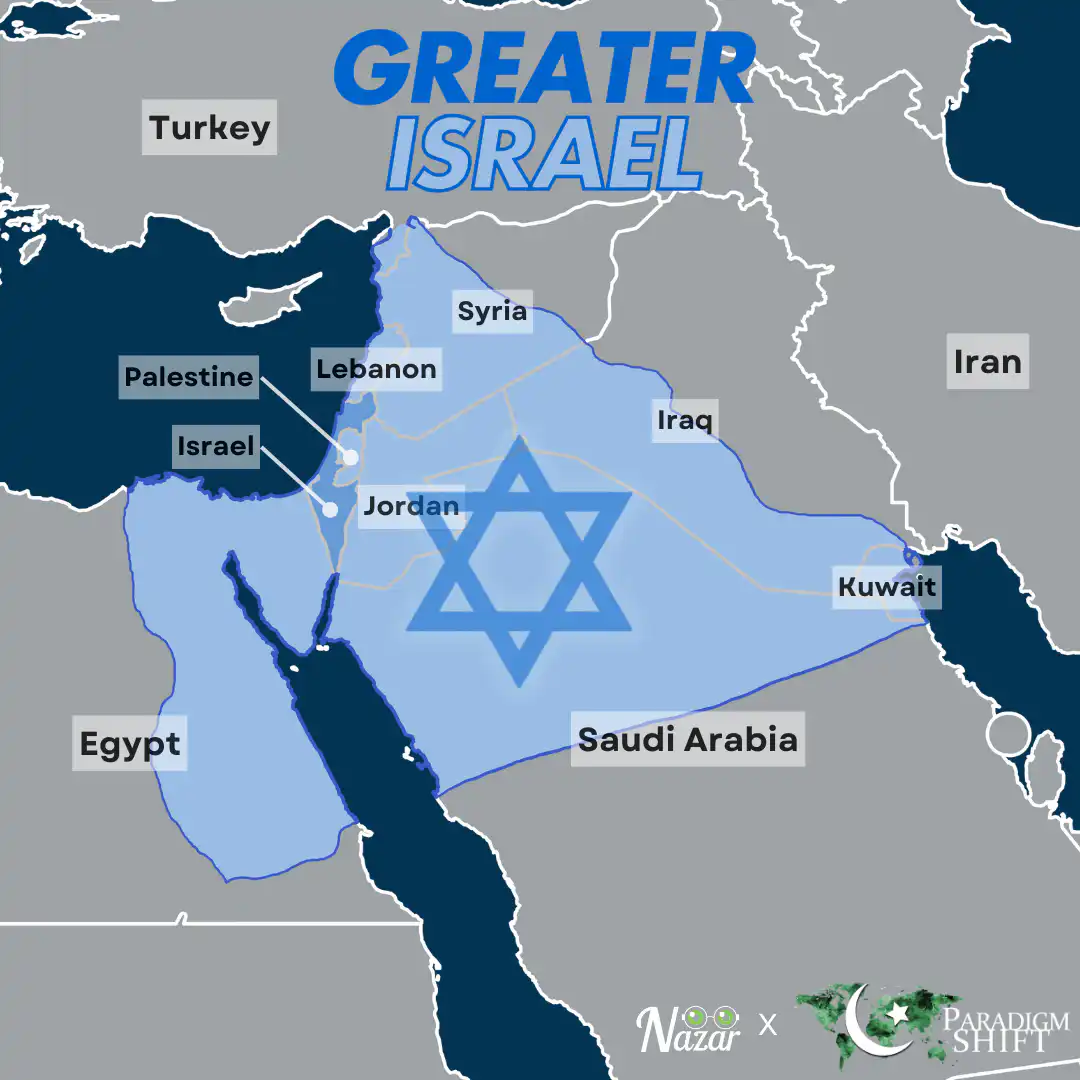
However, the interpretations given to these passages vary. Some see it as a symbolic representation of the promise that was contained in the covenant made by God with the Israelites. The accent would be on spiritual dominion rather than any claim over territory. Others may take it literally, as though the promises therein are a guideline to conceive of a vast Jewish state.
Historical Context
Following Jewish exiles and displacements, especially during the 6th century BCE, the notion of a promised land occupied pride in the rise of post-exilic Jewish identity. Even more so during the Roman period, this hope of restoration became an abiding mark in Jews’ lives because of the destruction of the Second Temple in 70 CE, which gave birth to the concept of diaspora itself.
Still, through these times, Greater Israel was seen as an ideal rather than an idea upon which Jewish nationalism could be founded. This fallacious thinking was held in check by the concerted efforts of people who were bent upon preserving their distinct cultural and religious identities, even when they were miles away from their homeland.
By the time of the Middle Ages, Jewish scholars such as Rashi and Maimonides often referred to the promised land in their interpretations of the scriptures, thereby keeping the idea within the framework of Jewish theology. Hardly ever did these theological treatises address the question of political and territorial ambitions, allowing them to elevate their appeal within Christian circles.
Zionist Reinterpretation
In the late 19th century, political Zionism became a lively debate around Greater Israel. Secular nationalists like Theodor Herzl began a movement for planting Jewish settlements in Palestine, seeing it as a haven from anti-Semitism in Europe.
In focusing primarily on securing any part of Palestine for Jewish settlement, Herzl and the early leaders of the Zionist movement abrogated the biblical vision of Greater Israel. This alignment between biblical promises and nationalist aspirations brought a religious dimension to what was once a political project.
By the mid-20th century, following the establishment of the State of Israel in 1948, it had gained some steam among certain factions of Zionism. These groups viewed the Six-day War as divine confirmation of their territorial claims when Israel took the West Bank, Gaza Strip, Sinai Peninsula, and Golan Heights. Greater Israel thus gave these factions a rallying cry and an ideological frame that incorporated all religious, historical, and political narratives.
Theological Interpretations of Greater Israel
Theological interpretations of the concept of Greater Israel vary considerably among various religious traditions. These interpretations reflect, in some measure, not just scriptural enactments but also the socio-political context in relation to which religious communities are operating.
Christian Interpretations
The notion of Greater Israel occupies a sphere of overall importance to the theology of several Christian denominations, especially American Evangelicalism. Their interpretations are invariably molded by dispensationalism: the theological framework that proposes that God’s plans are being worked out in stages, distinct epochs, or “dispensations.”
Dispensationalist Theology and Prophecy
For many Evangelicals, the state of modern Israel is the fulfillment of biblical prophecy and the prelude to the second coming of Christ – an idea based on interpretations of the Book of Revelation, Daniel, and Ezekiel that usually focus on some far-fetched prognostications concerning events leading to the end of times.
In this context, restoring Israel to its “biblical borders” is understood to be a necessary step in a project of God’s divine plan. This means considerable political and financial support from the Evangelical community for the present State of Israel, particularly in supporting Israeli sovereignty over the West Bank or Jerusalem.
Christian Zionism
Christian Zionism, a movement that is closely connected with Evangelical thought, actively advocates the idea of Greater Israel. The leaders of this movement argue that supporting Israel’s territorial expansion conforms to the will of God, which brings blessings to those who support Israel’s cause, quoting Genesis 12:3, “I will bless those who bless you, and whoever curses you I will curse.”
Not all Christian groups agree with this view. Mainline Protestant denominations and the Catholic Church tend to stress justice, reconciliation, and coexistence in the Holy Land. They criticize Christian Zionism for placing political agendas over the welfare of all of the people in the region, including the Palestinians.
Islamic Perspectives
Many scholars of Islam contest the concept of greater Israel in theology. A Muslim perspective on the idea takes on a dimension that often tends to be political, as they see in it a challenge to the general Islamic canons of justice and peaceful coexistence.
Critique of Scriptural Claims
There is tremendous debate amongst Muslim scholars surrounding the highly disputed area of Greater Israel, which claims that these biblical roots are misrepresented or are irrelevant in a modern context. The Quran does not recognize territorial claims on ancient scriptures; rather, it has emphasized justice for all human beings, Christians, Jews, and Muslims, without regard to race or religious allegiance.
Islam does not endorse the concept of exclusive ownership or expansionist policies, as seen in the Greater Israel interpretation; rather, they must align with the Quranic vision of coexistence and shared heritage in which land is sacred to all believers.
Support for Palestinian Rights
For Muslims, the battle against Greater Israel ideology relates to the protection of Palestinians’ rights. Al-Quds (Jerusalem), with extreme religious connotations for Islam, currently comprises an important part of this resistance. Many Islamic leaders see Israeli expansionism and the policies supportable with Greater Israel as assaults against the people of Palestine that undermine the Palestinians’ rights of ownership of their land and their full sovereignty.
Political and Religious Dimensions
Islamic discourse also criticizes the political use of religious narratives to justify claims for territorial annexation. Scholars and leaders underline that these served a political agenda, rather than building peace and religious fraternity. This critique is directed against not only the Zionist interpretations but also a whole host of Christian Zionist efforts that backed Greater Israel policies.
Greater Israel in Modern Geopolitics: The Zionist Expansionist Plan for the Middle East
The modern geopolitical implications of the Greater Israel concept have played a pivotal role in shaping regional politics, diplomatic relations, and the Israeli-Palestinian conflict. While rooted in ancient promises, the idea has taken on new dimensions in the context of contemporary state-building and geographical (territorial) expansion. This section explores the developments since 1948 and the Balfour Declaration, the policy of settlements, and the impact on Israeli-Palestinian relations.
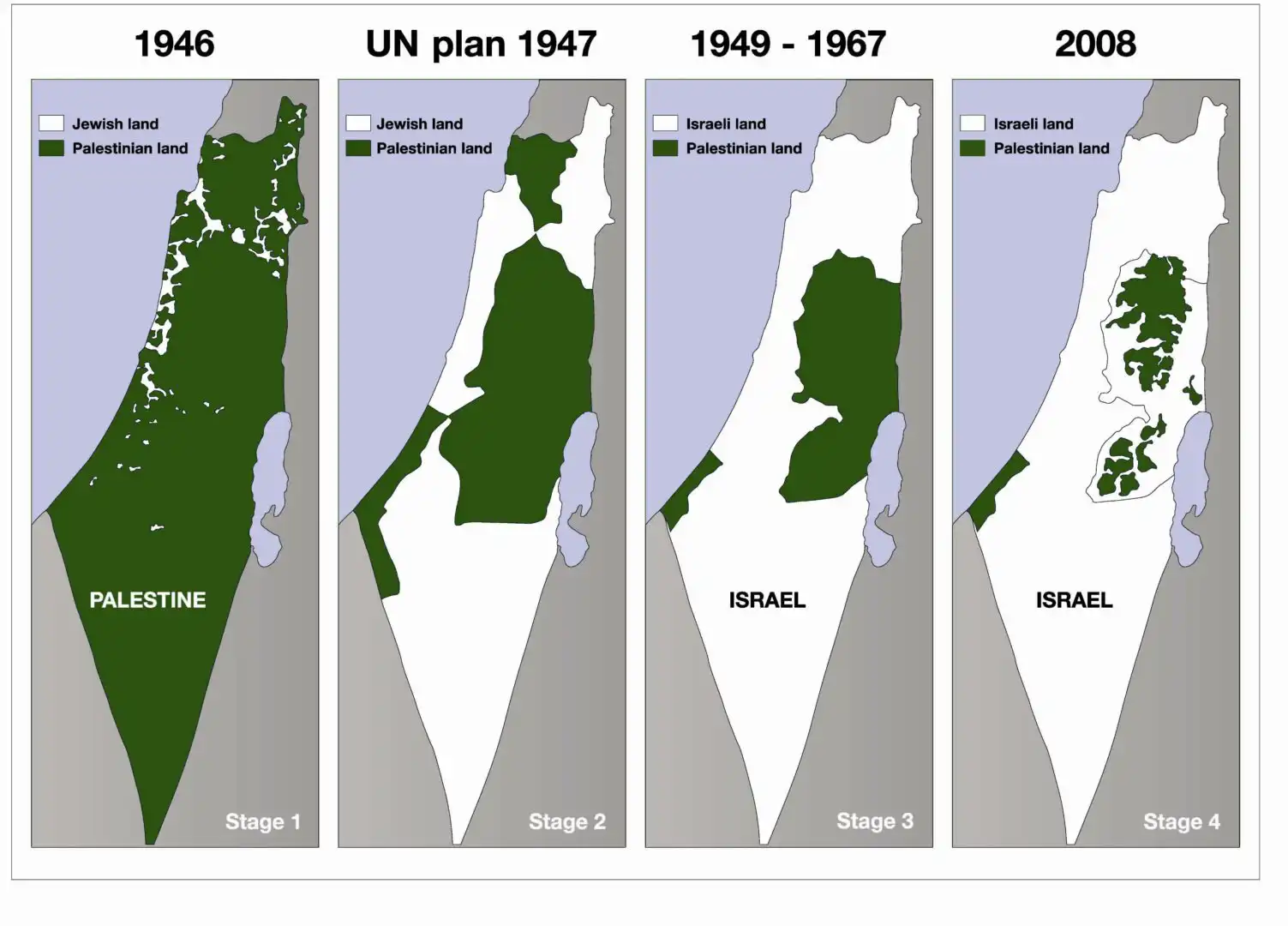
Post-1948 Developments
The establishment of the state of Israel in 1948 marked a critical event in the history of the Jews, fulfilling a long-standing dream for a national homeland. Riding on this hope were controversies for the Arabs about the territorial boundaries of the new state.
The initial borders of Israel were formulated based on the United Nations Partition Plan of 1947, proposing separate territories for Jewish and Arab states while declaring Jerusalem an international city. The 1948 Arab-Israeli War changed this, and subsequently, territorial adjustments were made, partly or rather fully with a greater part of land acquired by Israel than was planned, which created a spark of tension with the neighboring Arab states, displacing such a huge number of Palestinians.
After the 1967 Six-day War, the notion of Greater Israel again took center stage. This brief yet major conflict saw Israel, capturing:
- The West Bank and East Jerusalem from Jordan,
- The Gaza Strip and the Sinai Peninsula from Egypt,
- The Golan Heights from Syria.
These territorial gains were viewed by some religious Zionists and political leaders as a partial fulfillment of biblical promises. For the advocates of Greater Israel, the Israeli military triumphs were to be interpreted as not simply military successes but more so as a Christian justification for the repossession of ancient lands linked to Israel.
Israeli Settlements and Policy
Israeli settlement activity in the West Bank gives concrete expression to the Greater Israel ideology. Since the 1967 war, the different Israeli governments designed policies in favor of establishing Jewish settlements in the occupied Palestinian territories, specifically in the occupied West Bank and East Jerusalem.
Settlement Expansion and Its Justifications
- Biblical Promises: Many settlers imagine they are fulfilling the divine promises in Torah by their presence in the West Bank, particularly Judea and Samaria.
- Security Concerns: The settlers among the Jewish population also argue that by creating buffer zones and strategic outposts, settlement serves to bolster Israel’s security.
- National Identity: For a number of Israelis, expanded settlements reflect reclaiming their ancestral homeland and underpinning Jewish sovereignty over the land.
Criticism and Controversies
- Obstacle to Peace: Critics advancing the viewpoint of international organizations, including the UN and EU, argue that the settlements are in violation of international law and an impediment to a two-state solution. By shattering the prospects of an independent Palestinian state, the settlements undermine the potential for a meaningful resolution.
- Human Rights Violations: The settlements normally involve replacing Palestinian communities, confiscation of lands, and restriction of Palestinian movement. These actions aggravate the tension and preserve the cycle of violence.
- Economic Disparities: Settlements are traditionally well-funded and equipped. The differences in development and resource access are remarkable when the surroundings of Palestinian areas are subjected to harsh treatment.
Israeli government policy regarding settlements manifests itself as the intermeshing between aspirations and smart conclusions. Some leaders may advocate restraint in the hope of preserving international goodwill and stability, while others have placed settlement expansion at the cornerstone of their Greater Israel vision.
Israeli-Palestinian Relations
The Greater Israel paradigm has heavily influenced the Israeli-Palestinian affair, often standing for an object of controversy and a symbol of a greater ideological divide.
For Israelis
Within Israeli society, opinions regarding Greater Israel vary widely, covering an entire spectrum of political and religious beliefs:
- Right-Wing Nationalists: Certain factions, especially those connected with religious Zionism and right-wing politics, advocate for annexation of the entire West Bank, arguing that it is an inseparable part of the biblical Land of Israel. They argue that the land must be extended, both as a religious duty and as an Israeli political imperative to assure its security into the future.
- Moderate and Left-Wing Israelis: Many Israelis reject the Greater Israel narrative and give priority to peace and coexistence rather than the claims of land. They argue that annexing would threaten their democratic character and lead to isolation from the international community.

For Palestinians
To them, Greater Israel remains one of the most direct threats to their achievement of national aspirations and human rights:
- Denial of Statehood: The Greater Israel concept ignores the Palestinians’ right to self-determination and independence as a state emerges within the 1967 boundary.
- Loss of Homeland: Palestinians see the Israeli land expansion and settler colony as continuing the dispossession that began in 1948, which further alienates them from the land.
- Daily Struggles: The occupation and settlement policies tied to Greater Israel ideology create so many sicknesses in the lives of the Palestinians; many are unable to move freely, while others are forced to contend with gross inequity.
The Two-state Solution vs. Greater Israel
Attempts to mitigate the conflict between Israelis and Palestinians are challenged by a host of compulsions and the drive toward a Greater Israel is somewhat said to be inconsistent with the vision of a two-state solution.
Diverging Narratives
The claims of land between the Israelis and Palestinians stem from history, religion, and identity, making it an intangible stone wall that renders negotiation obsolete. The Israelis draw on biblical promises and historical claims to buttress their right to exist; in addition, after centuries of discrimination, brought to a head after the Holocaust, the necessity for a secure homeland is justified. The narrative highlighted the very existence of the nation as a refuge and a divine inheritance.
The Palestinians, on the contrary, perceive the land as their ancestral home, which they have inhabited for several generations before the founding of the state of Israel, while for them greater Israel equates to dispossession, loss of identity, and loss of their basic rights. Both narratives prejudiced their perceptions of each other, characterized by mutual resentment, making understanding and compromise exceedingly difficult. Uncompromising positions on key issues, including Jerusalem, borders, and the right of return for Palestinian refugees, have become difficult, as each side has rejected the possibility of ceding ground on that which they consider to be non-negotiable elements of their claims.
Political Polarization
The political landscape is characterized by deep divisions, with extreme elements exploiting the Greater Israel debate to stoke tensions and resist compromise. Within Israel, right-wing parties and settler groups frequently champion the Greater Israel concept, calling for the annexation of the West Bank and rejecting territorial concessions. These factions maintain that returning land threatens Israel’s security and challenges the biblical covenant.
By contrast, these other groups, especially the hardliners in Palestinian society, vehemently reject the legitimacy of the Israeli state as a truth and claim that negotiations amount to a surrendering process. The bearing of many extreme positions, however, would vitiate the moderates wanting a two-state solution as fear and distrust take precedence in public political discourses. Moreover, international involvement, although meant to bring peace, at times serves to escalate polarization. Outside actors may act specifically to strengthen extremist factions so as to further entrench opposing positions and disrupt efforts to arrive at a sustainable resolution.
This interaction of historical grievance and ideological stubbornness, all exercised and manipulated politically, guarantees that the search for peace remains a distant dream with the two-state solution and Greater Israel becoming mutually exclusive visions for the future.
The Future of Greater Israel
This concept is a hot topic of discussion amidst the rapidly changing political atmosphere and shifting social priorities. The notion of Greater Israel in Israeli society attracts a great deal of controversy as it is a microcosm of more general tensions between ideological aspirations and practical governance.
Ideologically, there are groups in Israeli society and in politics who continue to stand firmly with the concept of Greater Israel, considering it to be, in some manner, the fulfillment of destiny historically, religiously, and culturally. They cite biblical promises and the historical links of Jews to the land as the right to expand or retain control over lands like the West Bank. For them, surrendering these territories would be tantamount to a serious violation of Israel’s national security and a betrayal of the spiritual and historical connection of the people to the land.
On the contrary, increasing portions of Israeli society hold peace and stability over a greater priority than ideological advance. Ongoing conflict and international isolation are a major concern for many in balancing benefits against expanding into Greater Israel. These Israelis are calling for solution-oriented discussions and policies devoted to the long-term survival and well-being of the state without adhering strictly to the larger territorial claims of Greater Israel. They argue that adherence to the Greater Israel claim undercuts any prospect of achieving lasting peace with the Palestinians, causing continuous cycles of violence and resistance.
Another factor in the mix is population realities in the regional territories. For example, a single state that sought the incorporation of the West Bank would also be inexplicably allowing millions of Palestinians to become citizens or give some form of legal rights, and, thus, would force a transformation in Israel’s identity as a Jewish and democratic state. This possible demographic change horrifies many Israelis, even those who could otherwise advocate for territorial expansion, fearing it might jeopardize the already fragile balance between holding a Jewish majority and democratic principles.
The future of this Greater Israel idea will have to involve balancing out. It will lie with domestic pressures operating within Israel itself. At the same time, however, how the international community intervenes via mediation in disputes and the pursuit of international norms of acceptable behavior in dealing with Israelis and Palestinians will greatly influence the outcome.
Wider issues of justice, identity, and coexistence within the context of the future of the Greater Israel vision come into play. Will Israel reconcile its religious and historical aspirations with an interrelated and pluralistic world? Might the concept of Greater Israel even turn more into a symbolic affirmation of overall cultural and spiritual unity rather than one of territorial encroachments? These are open-ended questions, and their answers shall probably shape not only the course of the Greater Israel itself but also the peace and stability quest in the Middle East.
Conclusion
Greater Israel is an amalgamation of ideologies and political contentions. As this contextualized concept broadened into secular interpretations, it became excessively enmeshed in political ideas and territorial claims, driving the history of the Middle East itself.
The narrative, with wide-ranging ripple effects for Israeli-Palestinian relations, regional dynamics, and world diplomacy, has often set disparate camps against one another while igniting conflict. It has thus become paramount for the world to recognize the historical, religious, and political undercurrents motivating Greater Israel, particularly with this interminable conflict.
Any engagement with such dimensions should not just represent an excavation into the depths of the past but rather serve as a basis for dialogue that is meaningful in nature, coexistence, and respect for mutual human rights. Without that facilitation of dialogue and cooperation, any underpinning tensions will never be resolved and any possibility of communities relating peacefully and respectfully will always remain a distant dream. It is not an exaggeration to say that the stakes are sky-high, but building an inclusive and harmonized Middle East is equally possible.
If you want to submit your articles and/or research papers, please check the Submissions page.
The views and opinions expressed in this article/paper are the author’s own and do not necessarily reflect the editorial position of Paradigm Shift.

